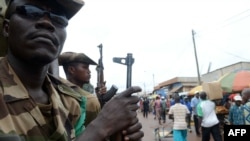UNITED NATIONS —
A senior U.N. official is warning that the Central African Republic could become a failed state if quick action is not taken.
U.N. Humanitarian chief Valerie Amos told the Security Council Wednesday that the political and security situation in the Central African Republic remains “volatile and unstable,” following a March coup that ousted President Francois Bozizé.
“The failure to act now could not only prolong and exacerbate the appalling conditions the people of the Central African Republic have had to endure, but could also see the crisis spread beyond its borders and throughout a region already facing enormous challenges,” she said.
Amos said the new national unity government is fragile and faces considerable challenges from the Séléka rebel coalition that overthrew the government.
She urged the Security Council to support the newly established African Union support mission (AFISM-CAR) which aims to protect civilians, restore security and reinstate the authority of the central government.
Amos said the country’s entire population of 4.6 million people has been affected by the crisis.
“Over the past months, the humanitarian situation has deteriorated dramatically and has shifted from being a long-term crisis of poverty and chronic vulnerability to a complex emergency characterized by violence, acute needs and grave protection issues,” she said.
Since the crisis began, more than 200,000 people have been internally displaced and nearly 60,000 have fled to neighboring countries, while many more continue to hide in the bush. Nearly half-a-million people are food insecure and the risk of disease outbreaks is very high.
U.N. Assistant Secretary-General for Human Rights Ivan Šimonović echoed her concerns. He is recently back from a week-long visit to the country and warned of serious human rights violations, including executions, arbitrary arrests and detentions, sexual violence, the recruitment of child soldiers and the looting and destruction of schools, hospitals and U.N. premises.
He said some communities have violently opposed Séléka elements trying to arrest alleged suspects and they have been subjected to brutal retaliation by the rebels, including killings and the burning of entire villages.
Šimonović said that while security has improved in the capital, Bangui, the state’s authority is almost non-existent in the rest of the country and has been replaced by unpaid Séléka forces who support themselves through extortion and looting, leading to an environment of rampant fear.
The U.N. officials asked the Security Council to support the regional stabilization mission, the scaling up of humanitarian aid funding, and the need for investigation and prosecution of grave human rights violations to try to avert a deepening crisis.
U.N. Humanitarian chief Valerie Amos told the Security Council Wednesday that the political and security situation in the Central African Republic remains “volatile and unstable,” following a March coup that ousted President Francois Bozizé.
“The failure to act now could not only prolong and exacerbate the appalling conditions the people of the Central African Republic have had to endure, but could also see the crisis spread beyond its borders and throughout a region already facing enormous challenges,” she said.
Amos said the new national unity government is fragile and faces considerable challenges from the Séléka rebel coalition that overthrew the government.
She urged the Security Council to support the newly established African Union support mission (AFISM-CAR) which aims to protect civilians, restore security and reinstate the authority of the central government.
Amos said the country’s entire population of 4.6 million people has been affected by the crisis.
“Over the past months, the humanitarian situation has deteriorated dramatically and has shifted from being a long-term crisis of poverty and chronic vulnerability to a complex emergency characterized by violence, acute needs and grave protection issues,” she said.
Since the crisis began, more than 200,000 people have been internally displaced and nearly 60,000 have fled to neighboring countries, while many more continue to hide in the bush. Nearly half-a-million people are food insecure and the risk of disease outbreaks is very high.
U.N. Assistant Secretary-General for Human Rights Ivan Šimonović echoed her concerns. He is recently back from a week-long visit to the country and warned of serious human rights violations, including executions, arbitrary arrests and detentions, sexual violence, the recruitment of child soldiers and the looting and destruction of schools, hospitals and U.N. premises.
He said some communities have violently opposed Séléka elements trying to arrest alleged suspects and they have been subjected to brutal retaliation by the rebels, including killings and the burning of entire villages.
Šimonović said that while security has improved in the capital, Bangui, the state’s authority is almost non-existent in the rest of the country and has been replaced by unpaid Séléka forces who support themselves through extortion and looting, leading to an environment of rampant fear.
The U.N. officials asked the Security Council to support the regional stabilization mission, the scaling up of humanitarian aid funding, and the need for investigation and prosecution of grave human rights violations to try to avert a deepening crisis.









